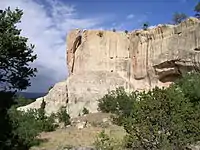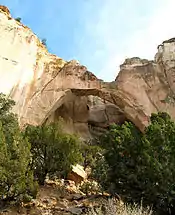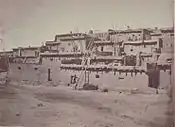Trail of the Ancients Scenic Byway (New Mexico)
The Trail of the Ancients is a New Mexico Scenic Byway to prehistoric archaeological and geological sites of northwestern New Mexico. It provides insight into the lives of the Ancestral Puebloans and the Navajo, Ute, and Apache peoples. Geological features include canyons, volcanic rock features, and sandstone buttes. Several of the sites are scenic and wilderness areas with recreational opportunities.
| Trail of the Ancients Scenic Byway | |
|---|---|
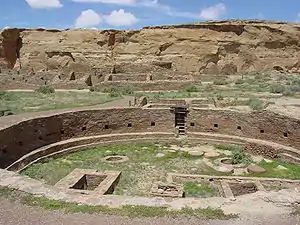 |
Route description
The Trail of the Ancients captures the archaeological evidence of hunter and gatherers who lived in the area since 10,000 B.C. or earlier,[1] in the northwestern portion of the state.[2][3] The Ancient Puebloans that lived in the area between about 850 and 1250 A.D.[4] are the ancestors of the modern Hopi, Zuni and Rio Grande Pueblo tribes. Navajos, from the Athabascan tribal areas in northwestern Canada, migrated into the area about 500 years ago.[5] Other Native Americans include the Utes and Apaches.[6]
Native peoples left evidence of their lives in ruins of agricultural communities, broken pieces of pottery, tools, pictographs, and petroglyphs. The landscape includes large sandstone formations, desolate deserts, interesting views, and geologic formations.[1]
A key site on the byway are the ruins at Chaco Canyon, which was the "ceremonial center" for puebloan people at that and outlying pueblos between 850 and 1250 A.D. Other key sites are the El Morro National Monument and El Malpais National Monument.[4]
A great portion of the land in northwestern New Mexico belongs to the Navajo Nation.[5] The route traverses multiple roads, including U.S. Route 64, U.S. Route 550, NM 57, NM 122 and other state, county and Navajo Nation roads.[7]
Chaco Culture National Historic Park
Chaco Culture National Historical Park, a UNESCO World Heritage Site that was inhabited in the canyon between 850 and 1250 A.D., is the center and starting point for the byway. It is located in a remote location on a rugged road. To reach the Chaco Culture site, follow National Park Service signs from U.S. Route 550, turning first onto County Road 7900.[8] There are a visitor center, six monumental sites, and a trail to other sites.[7]
Crownpoint
On NM 57[9] drive south of the park to NM 371 and drive south to Crownpoint, known for its monthly auction of Navajo rugs.[7]
Casamero Pueblo
Continue south on NM 371 to Navajo Road 48. Turn right on McKinley County Road 19 and continue on the road to the Casamero Pueblo, which was an outlier of the Chacoan site between about A.D. 1000 and 1125.[7][10]
Grants volcanic sites
Travel south on McKinley County Road 19 to NM 122, turn left and travel the road to Grants, where there is the New Mexico Mining Museum. Continue on NM 122 to NM 117 and drive south to the El Malpais National Monument, made about 3,000 years ago by lava flows.[7][11]
Return to Grants and from NM 122, take NM 53 south to the Ice Cave and Zuni-Bandera volcanic field, where there is the "Chain of Craters" of cinder cones.[7][11]
El Morro
Drive west on NM 53 to El Morro National Monument, a large butte that appears "like a huge ocean liner" on the horizon.[7]
Zuni Pueblo
Continuing west on NM 53, the Zuni Pueblo with six original sites was the goal of Francisco Vázquez de Coronado in his search for the "Seven Cities of Gold."[7]
Gallup
Gallup is located north on NM 602, where there is a mural to the Navajo Code Talkers of World War II, Indian crafts for sale, a Visitor's Center, the Rex Mining Museum, and the historic El Rancho Hotel & Motel.[7]
Trading posts
Two Grey Hills and Toadlena are two trading posts located north of Gallup in Newcomb on U.S. Route 491. There are about 1,500 Navajo people living near the trading posts, some of whom who sell their woven rugs at the trading posts.[7][12]
Farmington
Farmington, where two thirds of the surface water in New Mexico flows through area rivers, is north on U.S. Route 64. Recreational trails and the Farmington Museum are key sites.[7]
Aztec Ruins National Monument
Two pueblo ruins at the Aztec Ruins National Monument, an outlier of the Chacoan Canyon site, are near Bloomfield,[7] which is east of Farmington off of U.S. 64.[13]
Badlands recreation areas
South of Bloomfield off of NM 371, in the badlands of New Mexico, are the Bisti Wilderness Area, De-Na-Zin Wilderness Area, and Angel Peak Scenic Areas.[7][14]
History
The Trail of the Ancients Scenic Byway was made one of the New Mexico Scenic Byways after July 31, 1998[15] and by 2013.[16]
Gallery
 Examples of Navajo rugs
Examples of Navajo rugs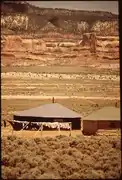 Examples of Navajo hogans
Examples of Navajo hogans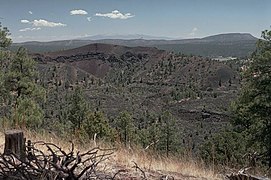 Bandera Volcano
Bandera Volcano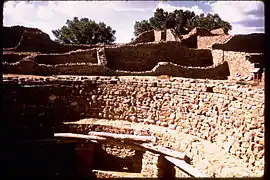

See also
- Scenic byways in the United States
- Trail of the Ancients - Four Corners, Colorado and Utah
References
- Overview. Trail of the Ancients. Navajo Nation Scenic Byways. Retrieved August 14, 2014.
- New Mexico - Other Byways. Federal Highway Administration. Retrieved August 14, 2014.
- Map on the Overview page. Trail of the Ancients. Navajo Nation Scenic Byways. Retrieved August 14, 2014.
- Navajo National Scenic Byways brochure. U.S. Department of Transportation. Federal Highway Administration. Retrieved August 14, 2014.
- Trail of the Ancients. Sangres.com Retrieved August 14, 2014.
- Trail of the Ancients. Aztec National Monument. Retrieved August 14, 2014.
- Trail of the Ancients. Archived 2014-08-21 at the Wayback Machine New Mexico Tourism Department. Retrieved August 14, 2014.
- U.S. National Park Service. Retrieved September 16, 2017.
- Chaco Culture Site to Crownpoint. Google maps. Retrieved August 14, 2014.
- "Casamero Pueblo | Bureau of Land Management". www.blm.gov. Retrieved 2021-01-01.
- Grants to El Malpais National Monument. Google maps. Retrieved August 14, 2014.
- Toadlena Trading Post, New Mexico. Google maps. Retrieved August 14, 2014.
- Farmington to Bloomfield. Google maps. Retrieved August 14, 2014.
- Bloomfield to Bisti. Google maps. Retrieved August 14, 2014.
- 18 NMAC 31.2 New Mexico Scenic and Historic Byways Program. Transportation and Highways. New Mexico Legislation. Filed February 27, 1998. Effective July 31, 1998. Retrieved August 10, 2014.
- New Mexico Designated Unique or Valuable Scenic Landscapes. United States Department of Agriculture. Natural Resources Conservation Service. Issued in 2013. Retrieved August 11, 2014. Note: Not the best source as not an official list, but it wouldn't have made it onto the list if it wasn't a byway; conversely there is one scenic drive (Dry Cimmaron) that is no longer a scenic byway
External links
- Trail of the Ancients, New Mexico Tourism
- Trail of the Ancients map and outline, Aztec Ruins National Monument
- Navajo Nation Scenic Byways - Travel Guidelines
